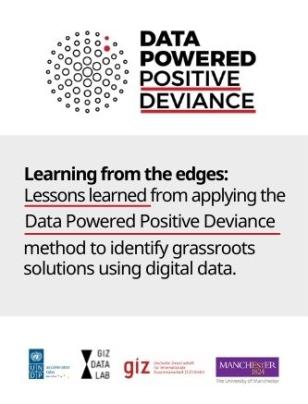Lessons Learned from Applying the Data Powered Positive Deviance Method to Identify Grassroots Solutions Using Digital Data

Lessons Learned from Applying the Data Powered Positive Deviance Method to Identify Grassroots Solutions Using Digital Data
October 4, 2021
The Data Powered Positive Deviance Initiative (DPPD) is a joint alliance initiated by the UNDP Accelerator Labs (AccLab) Network, Pulse Lab Jakarta, the University of Manchester (UoM), and the GIZ Data Lab. DPPD is based on the concept of Positive Deviance which assumes that in every community there are individuals or groups who develop unconventional practices that help them deal better with challenges than their peers.
This report “Learning from the Edges: Lessons Learned from Applying the Data Powered Positive Deviance Method to Identify Grassroots Solutions Using Digital Data,” presents six learnings on how to use non-traditional data sources to support a Positive Deviance approach to development practice. They are derived from four pilot projects, jointly conducted by the UNDP Accelerator Labs Network, the GIZ Data Lab, and the University of Manchester, that have tested the Data Powered Positive Deviance (DPPD) method in Ecuador, Mexico, Niger, and Somalia.
The report is written for development practitioners, data analysts, domain experts, and more generally anyone interested in using new data sources and technologies to uncover successful local solutions to development challenges.

 Locations
Locations




